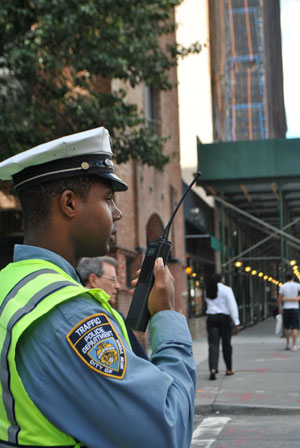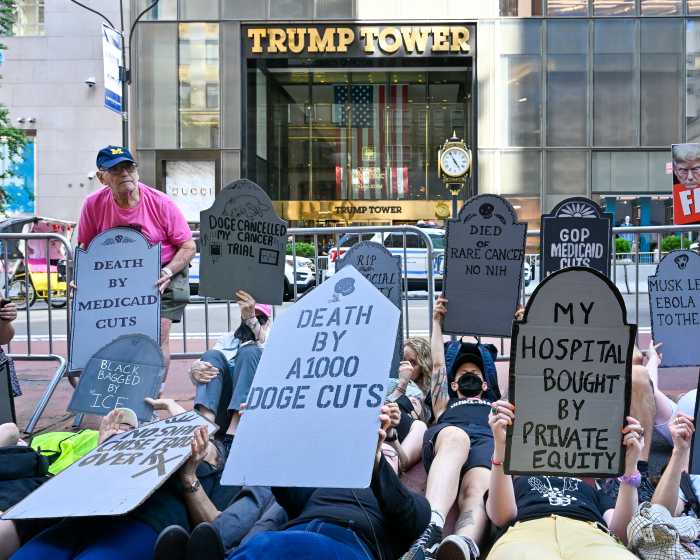
Their mission was hampered, however, by less-than-adequate communication. Now, U.S. Senators Jay Rockefeller, Kirsten Gillibrand and other elected officials are pushing for the passage of the Public Safety Spectrum and Wireless Innovation Act, a federal law that would create a single, nationwide radio network for all first responders.
The lack of a centralized communication system caused 9/11 rescue workers to have difficulty contacting one another inside and outside the Twin Towers that day, according to Rockefeller, who introduced the bill back in January.
“Calls were dropped. Orders and warnings didn’t get to front-line responders. Critical on-the-ground information couldn’t be relayed,” he said.
The proposed bill would allocate ten megahertz-worth of airwaves to first responders so that, rather than communicate via radio or cell phone, they would be able to have their own uninterrupted spectrum, called the “D-Block,” to transmit video, image and data files. The hand-held devices, which would resemble Smartphones, would permit firefighters to download intricate floor plans prior to entering burning buildings, for example, and allow emergency rescue personnel to send photos from an accident scene to doctors at a local emergency room.
The law would also enable the Federal Communications Commission to organize incentive auctions, in which telecommunications companies could voluntarily sell part of the spectrum they own back to the government. Funds raised by these auctions are projected to amount to billions of dollars beyond what is needed to finance the public safety network — the Congressional Budget Office anticipates some $6.5 billion in excess funds that could be used to pay down the budget’s deficit.
The 9/11 Commission report, Rockefeller noted, outlined in detail the need for the additional radio frequency to ensure connectivity and seamless communication in times of crisis, and called for a prioritization of federal funding for this type of initiative.
“Today’s first responders…risk life and limb at a moment’s notice to respond to emergencies without hesitation, and all without the ability to properly communicate,” Rockefeller said. “We made a promise almost ten years ago to stand by those who protect us no matter what. It’s time now that we make good on that promise.”
“You can’t have police officers rely on their own personal phones in the event of an emergency. It’s up to the federal government to provide that service,” said Sean Riordan, an attorney for the FealGood Foundation, a nonprofit formed after 9/11 that routinely advocates on behalf of first responders.
“We don’t ask cops to bring their own guns; we shouldn’t ask them to bring their own radio,” said Riordan
Lapses in communication contributed to a significant loss of life of policemen, firefighters and other rescuers, according to former 109th Precinct Police Department Detective Glen Klein, who arrived at Ground Zero on 9/11 around the time the south tower collapsed. Klein said first responders were scattered about the site, often not knowing each other’s whereabouts.
“Firefighters and police officers who came in to assist us from different states should have been able to contact the NYPD instead of everybody going off and doing what they felt like doing,” said Klein.
Also under the current system, police officers from neighboring precincts can’t speak to one another on the same frequency, Klein noted.
“We all work in the same city, but we have no contact with each other,” said Klein. “If there’s a shoot-out and a robbery on the same block, we wouldn’t be able to communicate with each other.”
Klein and more than a dozen 9/11 first responders joined John Feal, founder of the FealGood Foundation, on recent trips to Washington, D.C. to discuss the importance of the bill with various lawmakers. The advocates were hoping for a Congressional vote on the bill by the 10-year anniversary of 9/11, but are now expecting the vote to take place in October.
“If a 16-year-old has better reception on his iPhone than a cop or firefighter, there’s something seriously wrong,” Feal said. “This bill will provide a safety net for them. It’ll protect them while they’re protecting us.”
“Nearly 10 years after 9/11, we need to bring our first responders’ technology into the 21st century, starting by ensuring that local, state and federal first responders can effectively communicate in real time during a national crisis,” said Gillibrand, a co-sponsor of the bill. Gillibrand organized an Aug. 17 press conference at a Staten Island firehouse to lobby for its passage, and said, “It’s time to arm our first responders with the technology and resources they need to save lives.”





































